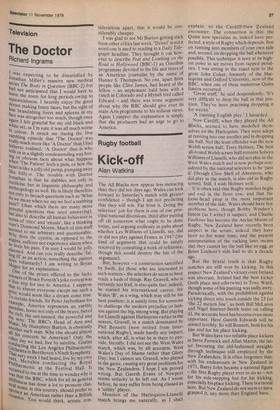Rugby football
Kick-off
Alan Watkins
The All Blacks now appear less menacing than they did ten days ago. Wales can look forward to Saturday's match with greater confidence — though I am not predicting that they will win. Far from it. Doing the selectors' job for them is one of our principal national diversions, third after putting off till tomorrow what ought to be done today, and arguing endlessly in pubs about whether Les Williams of Llanelli, say, did or did not play against France in 1947 (the kind of argument that could be simply resolved by consulting a work of reference, though this would destroy the fun of the argument). But, however — a construction sanctified by Swift, for those who are interested in such matters— the selectors do seem to have made a hash of things. Ray Gravell, who is certainly not frail, is also quite fast: indeed, he started his international career, for Wales 'B', as a wing, which may still be his best position: it is surely time for someone to challenge the modern prejudice or fashion against the big, strong wing. But playing for Llanelli against Harlequins earlier in the season, Gravell, in a match dominated by Phil Bennett (now retired from international Rugby), made hardly any impact; which, after all, is what he is there to provide, literally. I did not see the West Wales match, which was, by all accounts, West Wales's Day of Shame rather than GlorY Day: but I cannot see Gravell, who played in the game, causing any great problems for the New Zealanders. I hope I am proved wrong. But Gareth Evans of Newport seems unlucky to be left out. As I wrote before, he may suffer from being classed as a 'utility' player. Mention of the Harlequins-Llanelli match brings me naturally, as I shall explain, to the Cardiff-New Zealand encounter. The connection is this: the Quins now specialise in, indeed have perfected, a style of Rugby which depends, first on running into members of your own side and, second, on dropping the ball whenever possible. This technique is seen at its highest point in set moves from tapped penalties. I was sitting in the stand next to the great John Coker, formerly of the Harlequins and Oxford University, now of the BBC, when one of these numerous Quins fiascos occurred.
'Great stuff.' he said despondently. 'It's very difficult to drop the ball in that position. They've been practising dropping it for weeks.'
'A cunning English play,' I hazarded.
Now Cardiff, when they played the All Blacks, seemed to have modelled themselves on the Harlequins. They were adept at running into one another and in dropping the ball. Not the least offender was the new Welsh scrum half. Terry Holmes. The best all-round Welsh scrum half remains Selwyn Williams of Llanelli, who did not play in the West Wales match and is now perhaps considered by the national selectors to be 'past it' (though Clive Shell of Aberavon, who did play in the match, is also old in Rugby terms). Still, I wish Holmes well. It is often said that Rugby matches begin and end in the front row, and that the loose-head prop is the most important member of the side. Wales should have few problems here, though Bobby Windsor's fitness (as I write) is suspect, and Charlie Faulkner has become the Archie Moore of Rugby. New Zealand have recently been suspect in the scrum; indeed, they have been so for some time; and the present interpretation of the rucking laws means that they cannot lay the ball like an egg, as Brian Lochore's side had to do a decade ago.
But the brutal truth is that Rugby matches are still won by kicking. In this respect New Zealand's victory over Ireland was aberrant. Ireland had the best kicker (both place and otherwise) in Tony Ward, though some of his punting was sadly awry. Paradoxically, with the prohibition against kicking direct into touch outside the 25 (or 'the 22 meters line', as both Bill McLaren and Nigel Starmer-Smith insist on calling it), the accurate boot has become even more important. Here Gareth Edwards will be missed terribly. So will Bennett, both for his line and for his place kicking.
But Wales have two reliable place kickers in Steve Fenwick and Allan Martin, the latter favouring the old-fashioned straightthrough technique still employed by the New Zealanders. It is often forgotten that, with his endeavours in New Zealand in 1971, Barry John became a national figure — the first Rugby player ever to do so — not for his side-stepping but for his kicking, especially his place kicking. There is a moral here. But New Zealand do not seem to have grasped it, any more than England have.


































 Previous page
Previous page